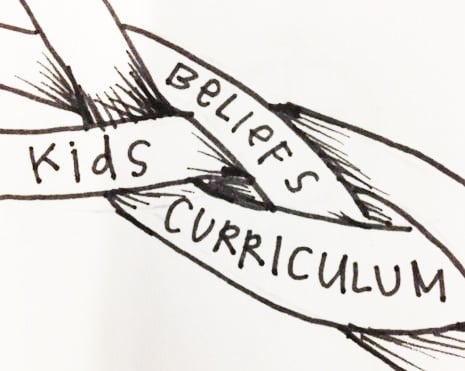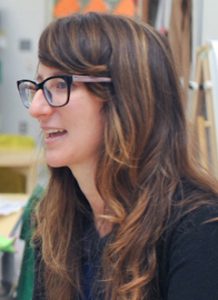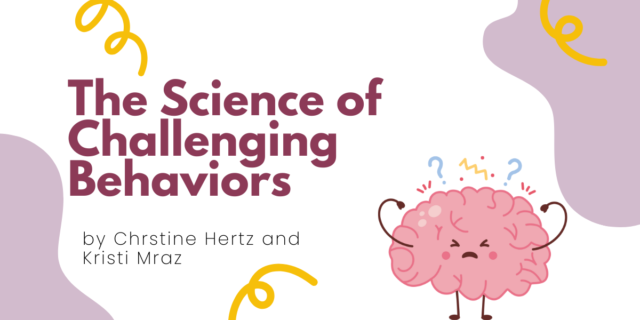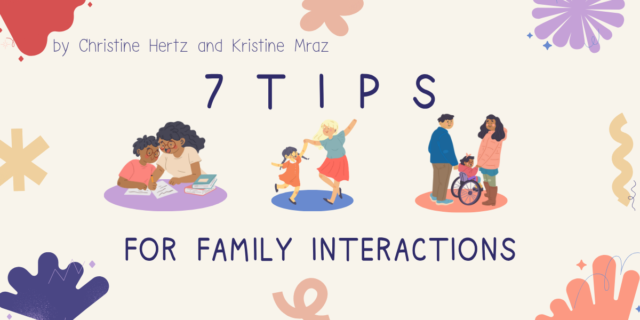

This post was written by Kristi Mraz and originally published on the author's own blog, kinder confidential. Find more at kinderconfidential.wordpress.com
Now is the time of the year when the daydreams of August turn into the real work of teaching. What were your hopes and dreams before school started? Have they gotten buried under a heap of paperwork, assessments, and things not going the way you hoped? Let’s dust them off and bring them back! My co-author and all around favorite human, Christine Hertz, and I are working on a blog series about integrating your beliefs into your curriculum, with (hopefully) some handy tips along the way.

Belief: Kids need to play
Reality strikes: The time to play keeps getting cut out our day because we have to get to all the writing (math, reading) lessons to make sure we keep pace/the work looks like the other classrooms.
This is a common bump in the road. We cut choice time or multiple recesses out because it seems to subtract from the work we think we need kids to be doing. We think more time doing the “thing” always helps the thing be better. But learning is not so neat and clean always. Putting kids first means that we have to shift our focus from what we are teaching to what our students are learning. And yes, there is a difference between thinking about what to teach, and thinking about what kids have learned.
Think for a moment about the skills that make up any one of the content areas (I will stick with writing) The list is huge:
- Story language/book language
- Story structure/book structure
- Visual memory (to make a letter, write a sight word, or draw a person)
- Gross motor
- Fine motor
- Letter-sound relationships
- Organization
- Executive functioning
- Physical stamina
- Memory
- Sequencing
Sometimes when we get really caught up in the teaching side of things, we try to plan the perfect minilesson or small groups to address these ideas- but for a moment let’s look at it from the learning side. It can be difficult to build up the muscles in these categories from a perfect minilesson, mostly what learners need are experiences and time to practice.
Basically when we ask kids to build these skills by writing more, it is like asking a basketball player to get better at basketball by only playing basketball games. As a former basketball player (an illustrious career that lasted exactly one year) I know that the game is a chance for you to show the skills you have built, but not always the place to build them.
To become better, more well rounded players we did more than just show up at the game. We had shooting drills, we ran laps, we went to the weight room to build our legs so we could jump higher, we had scrimmages with coaching as we played, we dribbled around cones, we spent time off the court talking about plays. Basically we gave time to developing each skill without the stress of the game looming over us. Then when the game came, we were stronger all around.
Now, before this gets too far I want to say loud and clear: KIDS SHOULD BE WRITING IN WRITING WORKSHOP EVERY DAY. The orchestration work they do there is monumental and amazing. But then I would also like to say loud and clear BUT THEY ALSO NEED TO HAVE A BALANCED DIET OF LEARNING TO BUILD ALL THE MUSCLES.
What makes you a great writer (reader, mathematician, thinker) is not the perfect lesson, its having the space and time to grow the muscles you need, so you can use them as a writer, and that is going to happen all across the day.
Let’s go back to that list, and start first with what we see kids struggling with and then let’s add in the things that help kids build these skills so they have stronger muscles the next time they go to write:
My kids struggle with… |
My kids might need to build… |
So we want to make sure they have ample time to… |
Elaboration, structure, plot or generating ideas |
|
|
Representational drawing, writing letters correctly, recalling visual details to add into their writing |
|
|
Getting tired, their writing is hard to read or all over the place. They say they are tired or their hands hurt. |
|
|
 Working those fine motor muscles while building a fortress in choice time
Working those fine motor muscles while building a fortress in choice time
Noticing a pattern? The things that help these muscles grow are traditionally thought of as “play” not “work”.
 Fantasy play supports oral language and understanding of story
Fantasy play supports oral language and understanding of story
Yet, when I play spiderman with my friends I am using story language and adhering to plot structures I have internalized. As I run around, my gross motor is developing and helping me build the stamina to hold my core upright as I write. When I pause to pick up some small and interesting stones on the playground and start to stack them, I am developing those small muscles that help me with my grip. When I put puzzles together or trace, my eyes and the visual processing portions of my brain are working on picture completion.
 Bouncing my way to a stronger core
Bouncing my way to a stronger core
So what does that mean? Don’t cut out choice time and recess to do more writing (or reading or math). Work hard to keep your day well rounded and full of opportunities to engage in play. Switch out your lens from what you need to teach off your lesson plans, to what your kids need to learn to be successful. Keep a diagnostic eye on your learners and know that the best learning opportunities may not look traditionally academic. It may even help to name specifically the skills your readers, writers, thinkers, mathematicians are work on and generate the myriad of ways they can practice across the day.
A belief in play and the reality that kids need to meet benchmarks are not mutually exclusive. Play is how we learn and where critical skills develop. The more well rounded our classrooms, the more we try to put kids first, the more successful they’ll be- in all they do.
 Kristine Mraz is coauthor—with Alison Porceli and Cheryl Tyler—Purposeful Play, the book that helps you make play a powerful part of your teaching. Her previous title is the bestselling A Mindset for Learning (coauthored with Christine Hertz), which provides practical and powerful strategies for cultivating optimism, flexibility, and empathy alongside traditional academic skills. She is also coauthor—with Marjorie Martinelli—of Smarter Charts and Smarter Charts for Math, Science, and Social Studies. Their popular blog Chartchums keeps teachers in touch with ongoing and relevant classroom issues and ways to use charts as a support. Chartchums is also on Facebook and on Twitter @chartchums!
Kristine Mraz is coauthor—with Alison Porceli and Cheryl Tyler—Purposeful Play, the book that helps you make play a powerful part of your teaching. Her previous title is the bestselling A Mindset for Learning (coauthored with Christine Hertz), which provides practical and powerful strategies for cultivating optimism, flexibility, and empathy alongside traditional academic skills. She is also coauthor—with Marjorie Martinelli—of Smarter Charts and Smarter Charts for Math, Science, and Social Studies. Their popular blog Chartchums keeps teachers in touch with ongoing and relevant classroom issues and ways to use charts as a support. Chartchums is also on Facebook and on Twitter @chartchums!
You can follow all of her adventures on twitter @MrazKristine or on her blog kinderconfidential.wordpress.com, where this blog was originally published.


